- Home
- Francine Rivers
An Echo in the Darkness
An Echo in the Darkness Read online
PRAISE FOR FRANCINE RIVERS
And the Shofar Blew
“Meticulously plotted, Francine Rivers’s new masterpiece, And the Shofar Blew, brims with unforgettable characters.”
—Romantic Times
The Atonement Child
“The Atonement Child is well written, presenting the truth about abortion in a compassionate, nonjudgmental way.”
—The Post-Abortion Review
The Last Sin Eater
“Rivers skillfully combines character and mood to create a haunting story that effectively depicts the horror of sin and the beauty of forgiveness.”
—CBA Marketplace
Leota’s Garden
“Francine Rivers is a master gardener, deftly pruning brush and deadwood, using poignant humor and bittersweet revelation to open hearts to reconciliation.”
—Romantic Times
Lineage of Grace series
“Readers will find this book worth reading more than once. . . . Masterfully written.”
—Romantic Times
“Rivers’s writing is excellent.”
—Publishers Weekly
“Rivers is such an excellent author. Her people are vibrantly alive, with all the strengths and weaknesses that make them so human.”
—Historical Novels Review
Mark of the Lion series
“Francine Rivers puts readers right into the history of the moment. . . .”
—Romantic Times
Redeeming Love
“. . . a splendid piece of work.”
—Library Journal
“Rivers shines in her ability to weave together spiritual themes and sexual tension in a well-told story, a talent that has propelled her into the spotlight as one of the most popular novelists in the genre of Christian fiction. This is one of her best.”
—Amazon.com
“The truth that ran through that book [Redeeming Love] absolutely brought me to my knees. I was a changed person after reading that book.”
—Amy Grant, singer/songwriter, in an interview with Ted Koppel, ABC Nightly News
“. . . a thought-provoking novel that you will not easily forget.”
—Romantic Times
Sons of Encouragement series
“. . . packs a powerful punch through characters that resonate in the soul. Fast-paced and seamless, this is a magnificent tale of courage, faithfulness, woe, and great joy.”
—Romantic Times
Visit Tyndale online at www.tyndale.com.
Check out the latest about Francine Rivers at www.francinerivers.com.
TYNDALE and Tyndale’s quill logo are registered trademarks of Tyndale House Publishers, Inc.
An Echo in the Darkness
Copyright © 1994, 2002 by Francine Rivers. All rights reserved.
Discussion Guide section written by Peggy Lynch.
Cover illustration copyright © by Robert Papp. All rights reserved.
Cover designed by Ron Kaufmann
Interior designed by Zandrah Maguigad
Scripture used in Epilogue is taken from the New King James Version.® Copyright © 1982 by Thomas Nelson, Inc. Used by permission. All rights reserved.
Scripture used in Discussion Guide is taken from the Holy Bible, New Living Translation, copyright © 1996 by Tyndale House Foundation. Used by permission of Tyndale House Publishers, Inc., Carol Stream, Illinois 60188. All rights reserved.
This novel is a work of fiction. Names, characters, places, and incidents either are the product of the author’s imagination or are used fictitiously. Any resemblance to actual events, locales, organizations, or persons living or dead is entirely coincidental and beyond the intent of either the author or the publisher.
Library of Congress Cataloging-in-Publication Data
Rivers, Francine, date.
An echo in the darkness / Francine Rivers.
p. cm. — (Mark of the lion)
ISBN 978-0-8423-1307-0
1. Church history—Primitive and early church, ca. 30-600—Fiction.
2. Women slaves—Rome—Fiction. I. Title. II. Series: Rivers, Francine, date
Mark of the lion.
PS3568.I83165E24 1994
813′.54—dc20 94-5909
Build: 2012-11-14 16:55:13
This book is dedicated to Peggy Lynch
and Lynn Moffett, beloved friends and prayer warriors.
Contents
Foreword
Preface
Acknowledgments
Prologue
Part One: The Echo Chapter 1
Chapter 2
Chapter 3
Chapter 4
Chapter 5
Chapter 6
Part Two: The Clay Chapter 7
Chapter 8
Chapter 9
Chapter 10
Chapter 11
Chapter 12
Chapter 13
Chapter 14
Chapter 15
Chapter 16
Chapter 17
Chapter 18
Chapter 19
Part Three: The Molding Chapter 20
Chapter 21
Chapter 22
Chapter 23
Chapter 24
Chapter 25
Chapter 26
Chapter 27
Chapter 28
Chapter 29
Chapter 30
Chapter 31
Part Four: The Furnace Chapter 32
Chapter 33
Chapter 34
Chapter 35
Chapter 36
Chapter 37
Chapter 38
Chapter 39
Chapter 40
Chapter 41
Chapter 42
Chapter 43
Chapter 44
Chapter 45
Chapter 46
Chapter 47
Chapter 48
Chapter 49
Chapter 50
Part Five: The Golden Vessel Chapter 51
Chapter 52
Chapter 53
Epilogue
Promo 1
Glossary of Terms
Discussion Guide
FOREWORD
In 1992, Tyndale House made a conscious decision to begin publishing excellent fiction that would help us fulfill our corporate purpose—to “minister to the spiritual needs of people, primarily through literature consistent with biblical principles.” Before that time, Tyndale House had been known for many years as a publisher of Bibles and of nonfiction books by well-known authors like Tim LaHaye and James Dobson. We had dabbled in fiction before “Christian fiction” became popular, but it was not a major part of our publishing plan.
We began to recognize, however, that we could carry out our purpose very effectively through fiction, since fiction speaks to the heart rather than to the head.
Fiction is entertaining. Well-written fiction is gripping. As readers, we’ll stay up until 2:00 a.m. to finish a good novel. But Tyndale has a greater goal than simply entertaining our readers. We want to help our readers grow!
We recognize that authors have something of a bully pulpit for communicating their worldview and values to their readers. But with that opportunity comes a danger. Just what worldview and values is an author communicating? At best, most contemporary novelists present a squishy worldview. At worst, they sow negative values and unhealthy attitudes in the hearts of their readers. We wanted to set a whole new standard for fiction.
So we began looking for novelists who had a heart message that would help our readers grow. And we met Francine Rivers.
Francine had been extremely successful as a writer of romance novels for the general market early in her career. But when she became a Christian, she want
ed to use her talents to communicate faith values to her readers. One of her early projects was the Mark of the Lion trilogy.
When I read the manuscript for the first book in the series, A Voice in the Wind, I was blown away by the power of the story. I was transported back to the first century—to Jerusalem, Germania, Rome, and Ephesus. I lived with Hadassah as she struggled to live out her faith in the midst of a pagan Roman household. I felt the terror of the gladiator as he faced his foes in the arena. Above all, through their experiences I learned lessons in courage.
We are proud to present this new edition of the Mark of the Lion. I trust it will speak to your heart, as it has to mine and to hundreds of thousands of other readers.
MARK D. TAYLOR
President, Tyndale House Publishers
PREFACE
When I became a born-again Christian in 1986, I wanted to share my faith with others. However, I didn’t want to offend anyone and risk “losing” old friends and family members who didn’t share my belief in Jesus as Lord and Savior. I found myself hesitating and keeping silent. Ashamed of my cowardice and frustrated by it, I went on a quest, seeking the faith of a martyr. A Voice in the Wind was the result.
While writing Hadassah’s story, I learned that courage is not something we can manufacture by our own efforts. But when we surrender wholeheartedly to God, He gives us the courage to face whatever comes. He gives us the words to speak when we are called to stand and voice our faith.
I still consider myself a struggling Christian, fraught with faults and failures, but Jesus has given me the tool of writing to use in seeking answers from Him. Each of my characters plays out a different point of view as I search for God’s perspective, and every day I find something in Scripture that speaks to me. God is patient with me, and through the study of His Word, I am learning what He wants to teach me. When I hear from a reader who is touched by one of my stories, it is God alone who is to be praised. All good things come from the Father above, and He can use anything to reach and teach His children—even a work of fiction.
My main desire when I started writing Christian fiction was to find answers to personal questions, and to share those answers in story form with others. Now, I want so much more. I yearn for the Lord to use my stories in making people thirst for His Word, the Bible. I hope that reading Hadassah’s story will make you hunger for the real Word, Jesus Christ, the Bread of Life. I pray that you will finish my book and pick up the Bible with a new excitement and anticipation of a real encounter with the Lord Himself. May you search Scripture for the sheer joy of being in God’s presence.
Beloved, surrender wholeheartedly to Jesus Christ, who loves you. As you drink from the deep well of Scripture, the Lord will refresh and cleanse you, mold you and re-create you through His Living Word. For the Bible is the very breath of God, giving life eternal to those who seek Him.
Francine Rivers, 2002
ACKNOWLEDGMENTS
I want to acknowledge and thank two very special editors, both of whom have burned the midnight oil over my work, past and present: my husband, Rick Rivers, who has had a hand in my writing from the beginning, and Tyndale House editor Karen Ball. Rick cuts to the point. Karen polishes. Both have braved the wilderness of untitled chapters, tread through the marshes of run-on sentences, and slashed their way through thickets of unique punctuation and original spellings.
May the Lord bless you both.
PROLOGUE
Alexander Democedes Amandinus stood at the Door of Death waiting for the chance to learn more about life. Never having enjoyed the games, he had come reluctantly. Yet now he was transfixed by what he was witnessing, amazed into his very marrow. He stared at the fallen girl and felt an inexplicable triumph.
The mad intensity of the mob had always filled him with an unrest. His father had said some found release in watching violence done to others, and Alexander had thought of this when he had seen, on occasion, an almost sick relief in faces among the crowd. In Rome. In Corinth. Here, in Ephesus. Perhaps those who beheld the horrors were thankful to the gods that it was not they who faced the lions or a trained gladiator or some other more grotesque and obscene manner of death.
It was as though thousands came to find a catharsis in the bloodletting, that this embracing of planned mayhem protected each of them from the growing chaos of an increasingly corrupt and arbitrary world. No one seemed to notice that the stench of blood was no less strong than the stench of lust and fear permeating the very air they breathed.
Amandinus’ hands gripped the iron bars as he looked out upon the sand where the young woman now lay. She had come out from among the other victims—those who walked to their deaths—calm and strangely joyful. He could not look away from her, for he had seen in her something extraordinary, something that defied description. She had sung and, for the briefest moment, her sweet voice had drifted on the air.
The mob had overwhelmed that sweet sound, rising en masse as she had continued forward, walking across the sand serenely, straight toward Alexander. His heart had pounded harder with each step she took. She had been rather plain in appearance, and yet there had been a radiance about her, an aura of light surrounding her. Or had it just been his imagination? When the lioness had hit her, Alexander had felt the blow himself.
Now, two lions fought over her body. He winced as one beast sank its fangs deeply into her thigh and began to drag her away. The other lioness sprang, and the two rolled and clawed at one another.
A little girl in a ragged, soiled tunic ran screaming past the iron-gridded gate. Alexander gritted his teeth, trying to harden himself against the sound of those terrified cries. In trying to protect the girl, the child’s mother was taken down by a jewel-collared lioness. Alexander’s hands whitened on the iron-grated door as another lioness raced after the child. Run, girl. Run!
The sight of so much suffering and death assaulted and nauseated him. He pressed his forehead against the bars, his heart pounding.
He had heard all the arguments in favor of the games. The people sent to the arena were criminals, deserving of death. Those now before him belonged to a religion that encouraged the overthrow of Rome. Yet he couldn’t help but wonder if a society that murdered helpless children did not deserve to be undone.
The screams of the child sent a chill through Alexander’s body. He was almost grateful when the lioness’ jaws closed upon that small throat, extinguishing the sound. He let out his breath, hardly aware he had been holding it, and heard the guard behind him laugh harshly.
“Hardly a mouthful in that little one.”
A muscle jerked in Alexander’s jaw. He wanted to shut his eyes to the carnage before him, but the guard was watching now. He could feel the cold glitter of those hard dark eyes shining through the visor of the polished helmet. Watching him. He would not humiliate himself by showing weakness. If he was to become a good physician, he had to overcome his sensibilities and aversions. Hadn’t his teacher, Phlegon, warned him often enough?
“You have to harden yourself against those tender feelings if you are to succeed,” he’d said more than once, his tone ringing with disdain. “After all, seeing death is part of a physician’s lot in life.”
Alexander knew the older man was right. And he knew that, without these games, he would have no opportunity to further his studies of the human anatomy. He had gone as far as he could by studying drawings and writings. Only by performing vivisection could he learn more. Phlegon had been well aware of his aversion to the practice, but the old physician had been adamant, closing him in a trap of reason.
“You say you want to be a physician?” he had challenged. “Then tell me, good student, would you have a physician perform surgeries without firsthand knowledge of human anatomy? Charts and drawing are not the same as working on a human being. Be thankful the games give you such opportunity!”
Thankful. Alexander watched as, one by one, the victims went down until the horrific sounds of terror and pain were deadened by the relative quiet
ude of feeding lions. Thankful? He shook his head. No, that was one thing he would never feel regarding the games.
Suddenly another sound more dangerous than the lions began to hum. Alexander recognized it quickly—the ripple of boredom, the growing swell of discontent among the spectators. The contest was over. Let the beasts gorge themselves in the dark interiors of their cages rather than tax the crowd with tedious feasting. A dark restlessness swept through the stands like a fire in a cheap tenement.
The warning was quickly heeded by the editor of the games.
The beasts heard the gates swing open and dug in their claws and teeth more fiercely as armed handlers came out to drive them back into their cages. Alexander prayed to Mars, that the men would work quickly, and to Asklepios that there might be the flicker of life in at least one of the victims. If not, he would have to remain here until another opportunity presented itself.
Alexander was not interested in the drama of separating feeding animals from their kills. His gaze swept across the sand, searching for a survivor, any survivor, holding little hope that there was one. His eyes fell upon the young woman again.
No lion was near her. He found that curious, since she was far from the men driving the animals toward the gates. He saw a flicker of movement. Leaning forward, he squinted his eyes against the glare. Her fingers moved!
“Over there,” he said quickly to the guard. “Near the center.”
“She was the first one attacked. She’s dead.”
“I want to take a look at her.”
“As you wish.” The guard stepped forward, put two fingers to his lips, and gave two quick, sharp whistles. The guard made a signal to the plumed visage of Charon, who danced among the dead. Alexander watched the costumed actor leap and turn toward the fallen girl. Charon leaned down slightly, his feathered, beaked head turned as though listening intently for some sound or sign of life, all the while waving his mallet around in the air theatrically, prepared to bring it down if there was. Seemingly satisfied that the girl was dead, he grabbed her arm and dragged her roughly toward the Door of Death.

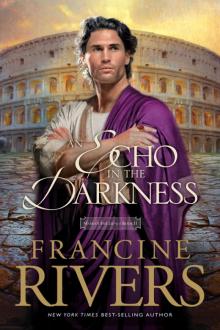 An Echo in the Darkness
An Echo in the Darkness A Lineage of Grace
A Lineage of Grace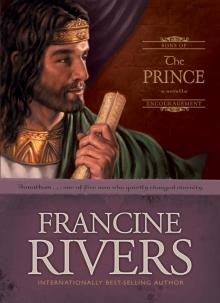 The Prince: Jonathan
The Prince: Jonathan Bridge to Haven
Bridge to Haven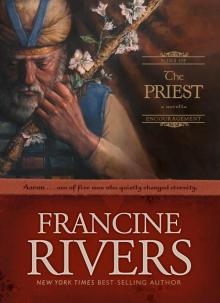 The Priest: Aaron
The Priest: Aaron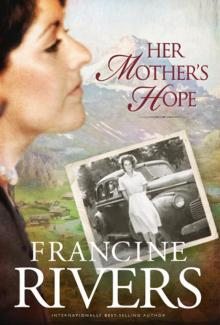 Her Mother's Hope
Her Mother's Hope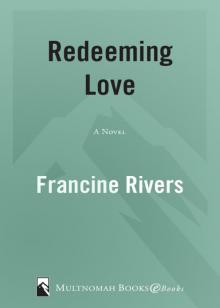 Redeeming Love
Redeeming Love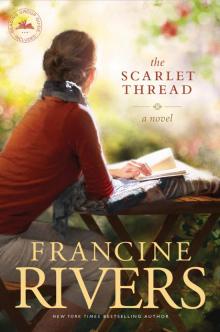 The Scarlet Thread
The Scarlet Thread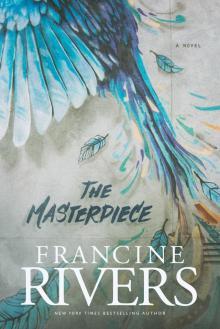 The Masterpiece
The Masterpiece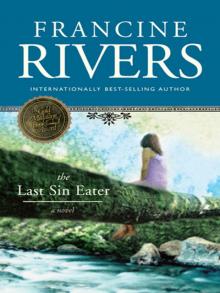 The Last Sin Eater
The Last Sin Eater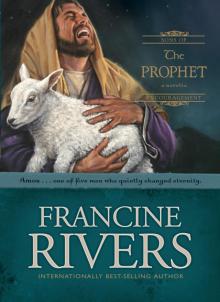 The Prophet: Amos
The Prophet: Amos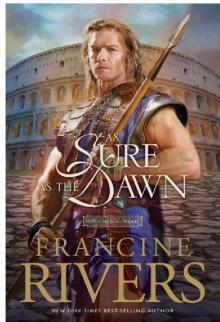 As Sure as the Dawn
As Sure as the Dawn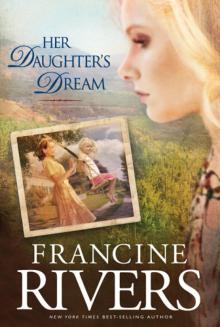 Her Daughter's Dream
Her Daughter's Dream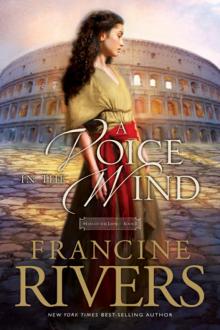 A Voice in the Wind
A Voice in the Wind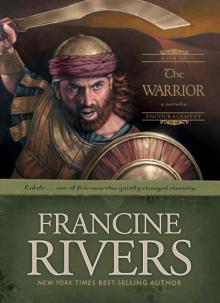 The Warrior: Caleb
The Warrior: Caleb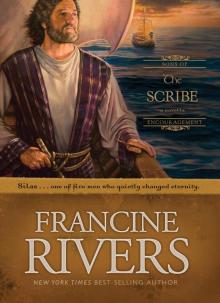 The Scribe: Silas
The Scribe: Silas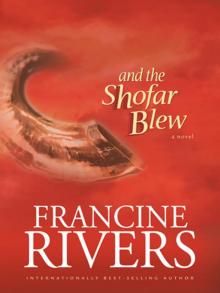 And the Shofar Blew
And the Shofar Blew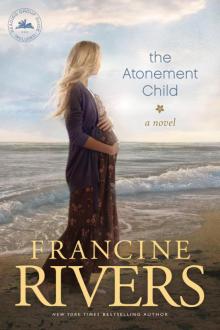 The Atonement Child
The Atonement Child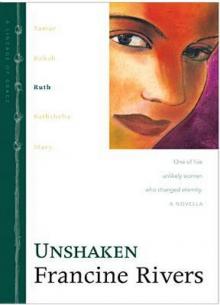 Unshaken_Ruth
Unshaken_Ruth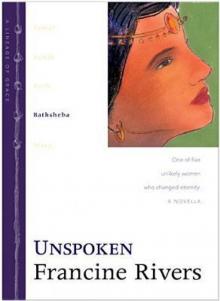 Unspoken_Bathsheba
Unspoken_Bathsheba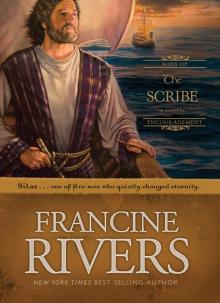 The Scribe
The Scribe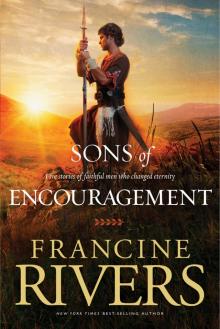 Sons of Encouragement
Sons of Encouragement The Shoe Box
The Shoe Box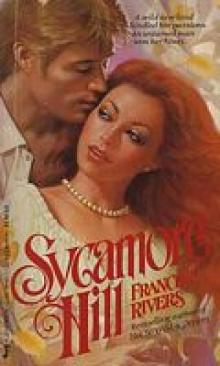 Sycamore Hill
Sycamore Hill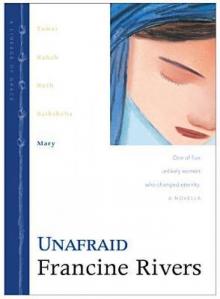 Unafraid_Mary
Unafraid_Mary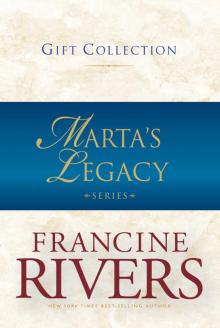 Marta's Legacy Collection
Marta's Legacy Collection